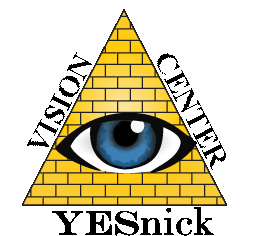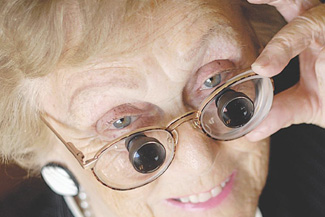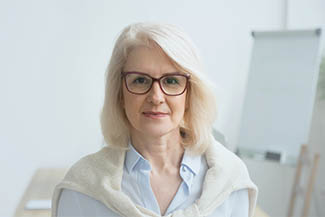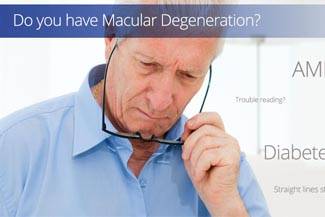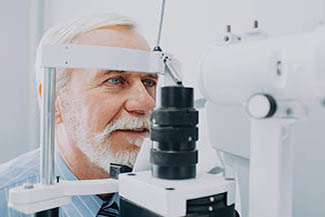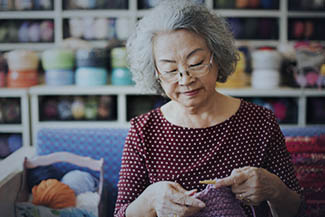
Macular Degeneration is a disease effecting over 15 million Americans. The disease is commonly found in seniors over the age of 60. As macular degeneration progresses it causes extreme damage to the macula of the eye causing central vision loss. Central vision loss is the clouding or darkening of the the part of your vision that recognizes faces, reads text, and watch television. Macular degeneration does not have a cure, but there are many options such as bioptics, telescope glasses, centrasight implants, and vision aids which can dramatically improve the quality of life of those with macular degeneration.

When discussing macular degeneration it is important to differentiate between the two varieties. Age related macular degeneration (AMD) is the type that affects seniors and comes in two forms wet and dry. Juvenile macular degeneration is a term used to refer to hereditary diseases such as Stargardts Disease, Best Disease, and Juvenile Retinoschisis which affect the macula of the eye in a similar way to AMD. The most common type is AMD, and within AMD 90% of cases are the Dry variety.

Adjusting to the changes to your life after receiving a diagnosis of macular degeneration is particularly difficult for most patients. Facing the news of macular degeneration, many patients battle with depression and anxiety. The loss of independence and mobility, the ability to see loved ones clearly, and the fact regular activities such as reading, grocery shopping, and computer use are now difficult cause particular distress. For that reason it is of extreme importance to visit an eye doctor who is specialized in macular degeneration. The doctor will help the patient learn about all the available tools, bringing a much needed sense of hope to the patient.
How Can I Reduce My Risk Of Macular Degeneration?
 Many of our patients ask our optometrist Dr. Yesnick if there are any preventative measures they can take to reduce their chances of having macular degeneration. While the disease is not completely understood, there are definitely things that can be done to reduce the chances.
Many of our patients ask our optometrist Dr. Yesnick if there are any preventative measures they can take to reduce their chances of having macular degeneration. While the disease is not completely understood, there are definitely things that can be done to reduce the chances.
Eating healthy or taking specific nutrients that are found in the macula, lutein, zeaxanthin and meso-zeaxanthin, can reduce the odds. For example fresh trout, salmon skin, leafy green vegetables and eggs. Most eye doctors recommend taking an AREDS2 formula supplement as the average daily intake of these nutrients is 1-3 mg while 6 mg/day has been shown to reduce the risk of macular degeneration. In addition to the AREDS2 formula many eye doctors recommend a diet high in fresh fish, or supplements of Omega 3. Recent research showed a decrease of incidents of macular degeneration of 40% with people who ate fish regularly.
Reduction of UV from the sun and blue light from computers and other electronic devices can reduce damage to the macula which is linked to higher instances of macular degeneration. The preferred method of protection is glasses with blue light and UV blocking coatings.
Recent research showed a 70% reduction in macular degeneration with subjects who walked 2 miles a day 3 times per week over 15 years.
What Are The Symptoms Of Macular Degeneration?
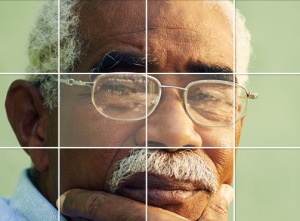 Most of the symptoms of macular degeneration revolve around impaired central vision. Common symptoms are blind spots in central vision, and blurry or fuzzy central vision. Furthermore the patient may have difficulty with differences in brightness such as going from indoors to outdoors, or may need a bright light to perform everyday tasks. Many patients report a difficulty with differentiation between changes in color and texture, which may be more common when using a computer. For those with the wet form of AMD, they may notice sudden accelerated vision loss or that straight lines appear wavy.
Most of the symptoms of macular degeneration revolve around impaired central vision. Common symptoms are blind spots in central vision, and blurry or fuzzy central vision. Furthermore the patient may have difficulty with differences in brightness such as going from indoors to outdoors, or may need a bright light to perform everyday tasks. Many patients report a difficulty with differentiation between changes in color and texture, which may be more common when using a computer. For those with the wet form of AMD, they may notice sudden accelerated vision loss or that straight lines appear wavy.
The common complaint is that recognizing faces, reading from a newspaper or letter, and driving become difficult and cause drastic changes in lifestyle.
What Tools Or Aids are Available For Patients With Macular Degeneration?
 CentraSight Implants:
CentraSight Implants:
Dr. Yesnick and Sandy Yesnick are privileged to have been chosen to be on the only team in Nevada to provide the revolutionary and state of the art CentraSight implantable telescope. The telescope implant is intended for patients with advanced stages of macular degeneration, and the praise from our patients who received these implants is incredible.
Visit Our CentraSight Page for more information.
Bioptics And Telescopes:
In the State of Nevada, people with macular degeneration may be able to meet the requirements for driving using bioptic telescopes. Our patients have had tremendous success regaining their independence; driving, reading, and recognizing faces, using telescopes for macular degeneration.
Visit our Telescopes and Bioptics Page for more information.
